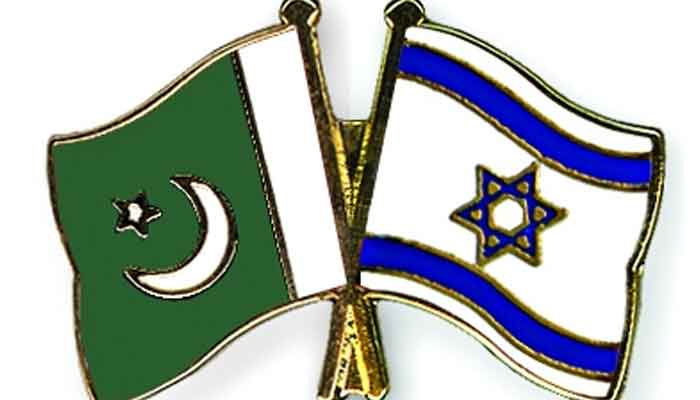Why Pakistan won’t be recognising Israel anytime soon
The flirtation with the idea of Pakistan's formal diplomatic relations with Israel may continue, but the present government in Islamabad lacks the political credibility to take such a step.
As rumors circulated last week that Pakistan was getting ready to recognize Israel, the army’s head of public relations, Maj Gen Asif Ghafoor, rejected the claim as part of some fifth-generation propaganda war against the country’s armed forces. According to him, such stories were planted in order to turn the general public against the military.
More: Interesting suggestions start pouring in for Pakistani govt regarding relations with Israel
Some conversations regarding the possible recognition of Israel may indeed have taken place in parts of the policymaking circle, but the general’s statement indicates that this thinking was probably abandoned immediately. Despite Pakistan’s politicians and generals often boasting that there are only two ideological states in the world — Israel and Pakistan — they are just not ready to establish formal diplomatic relations.
Related: Pak Jew allowed to travel to Israel for first time
This does not mean the idea is not discussed in the corridors of power. Confronted by a larger enemy in India, Pakistan’s military is fascinated, more than its civilians, by Israel’s capacity to keep its larger Arab neighbors at bay. Many in the security community have spoken about the dividends of recognising Israel. It could earn Islamabad some brownie points in the United States, especially in the eyes of those American Jews who are believed to be a powerful lobby. The only time an effort was made to formally change those nonexistent relations was under the former army chief and dictator, Gen. Pervez Musharraf. He tried to start a formal channel of communication in 2005. However, that effort collapsed after Musharraf ran into political trouble at home over his mishandling of the higher judiciary.
The Nawaz Sharif government that succeeded Musharraf did not pursue the matter — despite the fact that Pakistan’s romance with Palestine had started to wear off among policymakers. The whispers in the media and segments of the ruling elite were that if the Palestinians had relations with India and were not standing up on the Kashmir issue, why should Pakistan bother with Palestine? Such an argument, if publicly accepted, would help the military build direct ties with Israel.
There were even reports of an Israeli plane landing at an army base near Islamabad in October 2018, a visit that wasn't a civilian government-to-government rendezvous. (The Pakistani state never confirmed the visit of any Israeli officials or talks with the Israeli military.) There is also mention of the two militaries and their intelligence agencies working together to drive Soviet troops out of Afghanistan during the 1980s. But this was part of the armies working under a US umbrella, so there was no previous cooperation to build upon.
Notwithstanding that the religious-cultural discourse that evolved in Pakistan as a result of the Afghan war is much more hostile toward Israel than simply the Palestinian issue, Islamabad cannot afford to build diplomatic ties with Israel due to its high cost for the Kashmir conflict — which for Pakistanis is a life and death issue. The human rights atrocities, media clampdown by the Indian government and efforts to change the demographics in Kashmir have similarities with what is happening in the occupied territories, which Pakistan cannot overlook without undermining its own case vis-à-vis Kashmir. Moreover, what would the generals tell the public about reaching out to a state that sells more weapons to India than ever before, some of which were reportedly used during the bombing of Balakot, northern Pakistan, or against people in Kashmir earlier this year?
The American baggage also makes the issue extremely heavy. Pakistan wants to revive US military and financial aid, but that is long way from happening, so broaching the idea of recognising Israel would prove suicidal for Prime Minister Imran Khan or the military generals. Diplomatic relations might be digested better if Islamabad could prove to the public that it has visible benefits.
For Israel, building links with Pakistan is not hugely beneficial at this juncture — even if it is another Muslim country building diplomatic ties with it. And even if bilateral links were to start, it would be unimaginable to see El Al flights landing in Pakistan and bringing visitors, etc. Perhaps the television networks in Pakistan might stop blacking out Israeli teams during the Olympics, as has happened in the past, or some relief might be forthcoming to the one Jew officially living in the country. (After protesting for several years, Fishel Benkhald finally received permission earlier this year to travel to Jerusalem on his Pakistani passport.)
To be fair, better relations will not be sought by either side for altruistic reasons. Israel might like to explore the possibility of using Pakistan against Iran. Though Pakistan’s military is suspicious of Tehran, it has over years realised the worth of keeping the latter marginally sweet for its own security. In 2015, the Pakistani parliament turned down a request from Saudi Arabia — on whom Islamabad relies for oil at concessionary rates, and more — to deploy its troops in Yemen. With a 21 percent Shi’ite Muslim population, Pakistan cannot afford a sectarian conflict.
The flirtation with the idea of formal diplomatic relations may continue, but the present government in Islamabad lacks the political credibility to take such a step. Deepening institutional and political crises will make the project difficult for several years to come, at least until Pakistan gains a more confident government.
Ayesha Siddiqa is a research associate at the School of Oriental & African Studies (SOAS), London, and author of two books.
Courtesy: Haaretz
-
 Why Nicole Kidman 'not Rushing' Into Love After Split From Keith Urban?
Why Nicole Kidman 'not Rushing' Into Love After Split From Keith Urban? -
 Benny Blanco's Dirty Feet In Debut Podcast Divide The Internet
Benny Blanco's Dirty Feet In Debut Podcast Divide The Internet -
 Jeffrey Epstein Blamed King Charles As Andrew Left Trade Enjoy Job
Jeffrey Epstein Blamed King Charles As Andrew Left Trade Enjoy Job -
 King Charles Asked To Lean On Princess Anne To Avoid ‘media Circus’
King Charles Asked To Lean On Princess Anne To Avoid ‘media Circus’ -
 Passenger Wins £10,000 Payout From Heathrow Airport After 100 Ml Liquids Dispute
Passenger Wins £10,000 Payout From Heathrow Airport After 100 Ml Liquids Dispute -
 Eric Dane's Costar Under Fire For Hurling Accusations At Him After His Death
Eric Dane's Costar Under Fire For Hurling Accusations At Him After His Death -
 Queen Camilla Greets The Paddington Bear At BBC’s 500 Words Grand Final
Queen Camilla Greets The Paddington Bear At BBC’s 500 Words Grand Final -
 Chinese Astronauts Finally Reveal Why Spacecraft Left Them ‘stranded’ For 437 Days In Space
Chinese Astronauts Finally Reveal Why Spacecraft Left Them ‘stranded’ For 437 Days In Space -
 Sinitta Makes Shock Admission About Marriage To Andy Willner Post Simon Cowell Heartbreak
Sinitta Makes Shock Admission About Marriage To Andy Willner Post Simon Cowell Heartbreak -
 Bill Gates Calls Ties To Jeffrey Epstein 'huge Mistake,' Reveals Past 'affairs'
Bill Gates Calls Ties To Jeffrey Epstein 'huge Mistake,' Reveals Past 'affairs' -
 Switzerland Announces One-time Compensation For Swiss Bar Fire Victims
Switzerland Announces One-time Compensation For Swiss Bar Fire Victims -
 Ryan Coogler Shares Thoughts About Building Community Of Actors Amid 'Sinners' Success
Ryan Coogler Shares Thoughts About Building Community Of Actors Amid 'Sinners' Success -
 Heidi Klum Gushes Over Diplo Collab 'Red Eye' Despite DJ Falling Asleep During Video
Heidi Klum Gushes Over Diplo Collab 'Red Eye' Despite DJ Falling Asleep During Video -
 Israel Behind Majority Of Journalist Deaths Worldwide, Watchdog Claims
Israel Behind Majority Of Journalist Deaths Worldwide, Watchdog Claims -
 'It Would Become A Circus' : Inside Jane's Turmoil For 'little Sister' Fergie Whose Hidden From The World
'It Would Become A Circus' : Inside Jane's Turmoil For 'little Sister' Fergie Whose Hidden From The World -
 Inside Cardi B's Real Feelings Related To Stefon Diggs Split Post One Year Of Romance
Inside Cardi B's Real Feelings Related To Stefon Diggs Split Post One Year Of Romance




